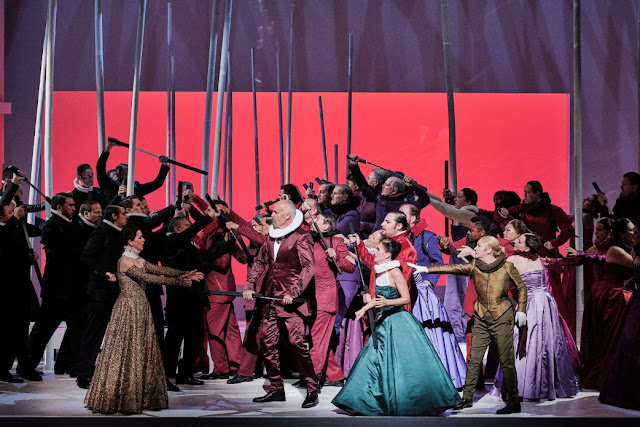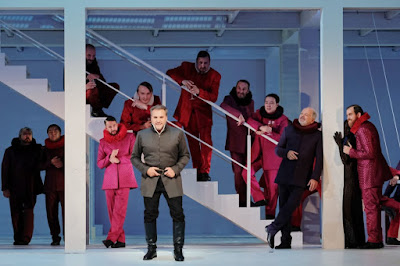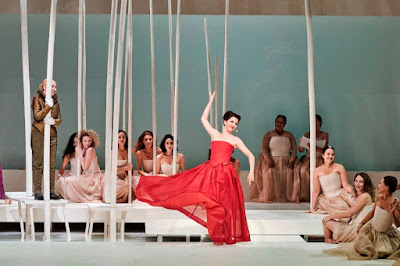 |
| Meyerbeer: Les Huguenots (end of Act 3) - Lisette Oropesa, Paul Guy, Ermonela Jaho, Florian Sempey, Karine Deshayes L’Opéra national de Paris (Photo Agathe Poupeney/OnP) |
Reviewed by Robert Hugill on 7 October 2018
Meyerbeer's grand opera returns to Paris in the first new production since the 1930s
 |
| Meyerbeer: Les Huguenots (end of Act 4) - Ermonela Jaho, Yosep Kang L’Opéra national de Paris (Photo Agathe Poupeney/OnP) |
This month (October 2018), there was a new production of the opera which effectively defined the Paris Opera in the 19th century, Meyerbeer's Les Huguenots. Between 1836 and 1936 the company gave over 1100 performances of the opera, then nothing. Until now.
Some of the silence is understandable (if not forgivable). Meyerbeer was Jewish and so clearly his music would not fit with the politics of the late 1930s, and then his style fell out of favour in the 1950s. But his operas have been steadily growing in interest again, partly thanks to some remarkable performances by smaller opera companies.
We saw the performance of Meyerbeer's Les Huguenots at the Opera Bastille on Sunday 7 October 2018. Conducted by Michele Mariotti, the production by Andreas Kriegenburg, with sets by Harald B. Thor, costumes by Tanja Hofmann and lighting by Andreas Gruter, featured Lisette Oropesa (replacing Diana Damrau) as Marguerite de Valois, Yosep Kang (replacing Bryan Hymel) as Raoul de Nangis, Ermonela Jaho as Valentine, Nicolas Teste as Marcel, Karine Deshayes as Urbain, Florian Sempey as le Comte de Nevers and Paul Gay as le Comte de Saint-Bris.
 |
| Meyerbeer: Les Huguenots Act 1 - Nicolas Teste L’Opéra national de Paris (Photo Agathe Poupeney/OnP) |
Meyerbeer was Jewish (he never converted, and to the end of his life he still counted in Hebrew), in a society that was innately anti-Semitic. In his two finest operas, Les Huguenots and Le Prophete, he used historical religious intolerance to hold a mirror up to society, and one of the reasons why the operas have retained their toe-hold in the repertoire is that they still hold the same mirror up to modern society.
Les Huguenots uses the French religious wars of the 16th century as its background, with the St Bartholomew's Day Massacre as its climax. When Les Huguenots was produced at Le Monnaie in Brussels in 2011 by Olivier Py, the production was quite dark, and it is this historical background which is important in the opera. Against it, Meyerbeer places the emotional and moral dilemmas of the protagonists.
Andreas Kriegenburg's production in Paris used the confection of setting it in the future, but Tanja Hofmann's costumes were effectively 19th-century style outfits, plus ruffs, for the aristocrats and vaguely Medieval for with contemporary details for the peasants. Against Harald B. Thor's brilliant white sets, these costumes gave the piece a modish cross-period look with a strong 1970s retro look. Thor's multi-level set worked well, but the bright white soon palled. Satisfactory as a back-drop for the lighter first two acts, with Andreas Gruter's candy-coloured lighting, you really wanted (but didn't get) something darker for the final three acts.
 |
| Meyerbeer: Les Huguenots Act 2 - Karine Deshayes, Lisette Oropesa L’Opéra national de Paris (Photo Agathe Poupeney/OnP) |
The casting was bedevilled by illness, first Diana Damrau dropped out to be replaced as Marguerite by Lisette Oropesa who learned the role in under a month. Then Bryan Hymel departed due to illness too, leaving even less time for Yosep Kang to take on the role of Raoul (Kang sang it with the Deutsche Oper in Berlin and sings the role in Dresden next year). Oropesa's assumption of the role of Marguerite was remarkably assured, but Kang did not feel as if he had had time to run it in properly.
Oropesa was simply stunning as Marguerite. It is not a large role, Act Two and the end of Act Three (no wonder Joan Sutherland chose it as her final role at the Sydney Opera House), but Oropesa made it count. She combined sparkling coloratura with a delightful personality, this was definitely a star turn.
The other female character, Valentine, was written for Cornelie Falcon a singer who has left casting directors with headaches. A dark soprano voice with a huge range and a strong lower register, the roles written for her in mind need a high mezzo-soprano or a soprano with a strong low and middle. Ermonela Jaho was stunning when it came to the depiction of Valentine's tortured mental states - she is in love with a man who rejects her, marries a man she hates and ends up converting to Protestant before her death. This was a dramatically vivid performance and when the part rose higher in her voice, Jaho's plangent tones really counted, yet in the middle and lower register, she simply did not have quite the heft. You rather wished that the Paris Opera had taken the risk of having Karine Deshayes (who sang Urbain) in the role.
 |
| Meyerbeer: Les Huguenots - Karine Deshayes L’Opéra national de Paris (Photo Agathe Poupeney/OnP) |
Meyerbeer was an almost exact contemporary of Rossini, yet Les Huguenots debuted seven years after Rossini's Guillaume Tell and Meyerbeer's technique remained routed in this earlier style, yet with an heroic mix too. Any tenor singing Raoul needs power, flexibility and comfort in the role's high register. So we should be grateful to Yosep Kang.
Of the seven leading characters, four were French and many of the smaller roles were taken by French singers giving a strong sense of style to the language of the work.
Karine Deshayes made a delightful Urbain, with a stylish account of her opening aria and creating a winningly charming personality. Nicolas Teste made a strong, sober Marcel, Raoul's Protestant servant who is inclined to sing Ein Feste Burg in moments of stress. Florian Sempey was delightfully camp as the roue Comte de Nevers who yet found the moral courage to reject participation in the massacre. Paul Guy was a strong, upright Comte de St Bris (Valentine's father). Well sung but perhaps not as dark and threatening as he could be. And I felt the great blessing of the swords scene in Act Four did not have as much weight as it could have done, though this was probably Kriegenburg's fault (it is worth bearing in mind that the scene was iconic enough in the 19th century for Offenbach to satirise it in La Grande Duchesse de Gerolstein).
The smaller roles were all well taken and highly characterfully given with Cyrille Dubois as Tavannes, Francois Rougier as Cosse, Michael Partka as Meru, Patrick Bolleire as Thore & Maurevert, Tomislav Lavoie as Metx, Philip Do as Bois-Rose, plus Julie Robard-Gendre, Elodie Hache, Olivier Ayault, John Bernard, Cyrille Lovighi, Bernard Arrietta and Fabio Bellenghi.
Whilst there is a light (almost G&S) element to some of Meyerbeer's writing, much of it is astonishing too such as the trio in Act Five for Raoul, Marcel and Valentine accompanied solely by bass clarinet. I felt that though Kriegenburg did not quite trust the piece, thankfully conductor Michele Mariotti did and he drew a strong performance from the cast, chorus and orchestra.
Thor's multi-level set in Acts One and Five enabled the chorus to make the maximum effect, and it really did create an extra character in the proceedings. Meyerbeer's orchestration, combining Germanic contrapuntal writing with French style, was finely appreciated by the orchestra.
 |
| Meyerbeer: Les Huguenots Act 1 - L’Opéra national de Paris (Photo Agathe Poupeney/OnP) |
Recommended Recording:
Meyerbeer - Les Huguenots: Ghylaine Raphanel, Françoise Pollet, Danielle Borst, Richard Leech, Gilles Cachemaille, conductor Cyril Diederich - Available from Amazon.











No comments:
Post a Comment